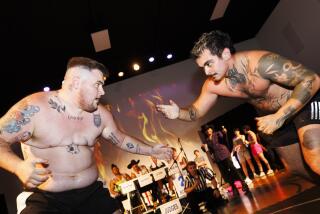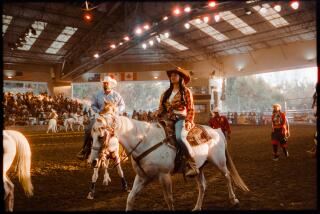Bucking Old Views of Black History
- Share via
Ronald Jennings is a bona fide Los Angeles cowboy -- mud-crusted boots, wide-brimmed hat and a sweaty handshake. The 23-year-old South Los Angeles native makes his living by selling horses and riding one-ton bucking bulls on weekends, owing a big part of his livelihood to the Bill Pickett Invitational Rodeo.
“This is the rodeo that motivated me to want to be a cowboy,” said Jennings, whose grandfather owned horse stables in Gardena. “This is where I rode my first steers and calves 15 years ago when I was a little kid.... Some kids play basketball, I ride horses. It’s kept me off the streets, you know.”
More than 14,000 people -- those seeking a dose of cultural enrichment mixed with full-fledged fans of calf roping and bareback riding -- crowded into the Los Angeles Equestrian Center on Saturday for the 20th anniversary show of America’s only all African American cowboy traveling rodeo.
The show is part serious competition and part educational program, awarding cowboys up to $10,000 in prize money and promoting the role of the black cowboy in the history of the West. Cowboys and cowgirls from throughout the country participate by invitation in the rodeo circuit, which runs from February to November. A few are full-time cowboys, but most are professionals in fields that include education, manufacturing, nursing and construction.
Although their ultimate goal is to win prize money to pay for their weekend rodeo trips, the cowboys say the Bill Pickett rodeo also offers them a chance to attract kids to their hobby or to pique their interest in a slice of black history.
“This is not just another rodeo, it’s about heritage,” said Ron Hunter, 40, a rodeo clown who is also the principal of Weleeka High School in Oklahoma. “We want young kids to know that there were real black cowboys; we weren’t just the cooks and the housekeepers.”
Lu Vason, the event’s founder and producer, attended his first rodeo in 1977 in Wyoming and became enchanted with the cowboy persona. But he noticed there were no black cowboys, prompting him to visit the Black American West Museum in Denver and learn about Bill Pickett, a black cowboy credited with inventing bulldogging.
Bulldogging is the extreme sporting event of the rodeo in which an ill-tempered steer is chased down by a cowboy on horseback at speeds of about 30 mph. The cowboy tries to position his horse alongside the steer, then using weight and momentum, grabs the steer’s right horn, veers off the horse and wrestles the 700-pound animal to the ground, leaving the steer lying flat on its side.
Vason, a special events producer, decided to pull together his first all-black rodeo in 1984 and named it after the first black rodeo athlete to be inducted into the Rodeo Hall of Fame in Oklahoma City, in 1984.
According to the Encyclopedia of the American West, nearly 25% of the more than 30,000 cowboys who worked the cattle frontier were black. Mention that to cowboys at the rodeo Saturday, and they are quick to talk about how they did not see their race so well represented in the western movies they loved as kids or in school history books.
“The movies didn’t portray the black cowboy. If you saw one, he was just working the ranch,” said Eddie Byrd, 37, of Beaumont, Texas, who is an industrial sandblaster and painter but ropes calves on weekends. He’s proud to call himself a fifth-generation cowboy; his great-great-grandfather worked on a big Texas ranch.
Marva Felchlin of the library at the Gene Autry Museum of Western Heritage said that questions about black cowboys are among the most common inquiries she receives, a reflection of a surge in interest.
But this was no afternoon history lesson. The rodeo was all action -- man against animal, beating hoofs, twirling ropes and jingling spurs -- as the sweet smell of barbecue and the potent odor of manure wafted through a sultry arena in the midday heat.
The faster the horse and the wilder the bronco, the louder the cheers.
“We love the excitement; the children love the action,” said April Williams, 54, part of a youth group field trip from Mt. Moriah Baptist Church in Los Angeles. “It’ been a yearly event for us for five years.... These kids need people they can identity with, and they are all so intrigued with cowboys.”
The first round featured the classic event of bareback riding, where cowboys rode bucking broncos with one hand, bodies flailing as the crowd cheered. Calf roping unfolded in seconds as cowboy after cowboy tried to swing a rope around a running calf and then tie up three of the animal’s legs.
“I like the bull riding; that’s my favorite,” said one 12-year-old boy eating a giant hot dog.
For Lugenia Ricks, 41, of Gardena, who runs a small nonprofit organization called Rodeo Wranglers for urban children, the Bill Pickett rodeo is the high point of the summer.
“Because of this event, these kids know that black cowboys were part of taming the Wild West, too,” Ricks said. “This is their chance to meet a real cowboy.”
Jennings said he makes a chunk of his living selling horses from stables in Long Beach and Gardena. But every weekend he’s at a rodeo, in places like Norco, Ventura and Chino.
Last month he won $3,300 for eight seconds of fine bareback riding.
“The better I ride, the more I make,” he said.
More to Read
Go beyond the scoreboard
Get the latest on L.A.'s teams in the daily Sports Report newsletter.
You may occasionally receive promotional content from the Los Angeles Times.










